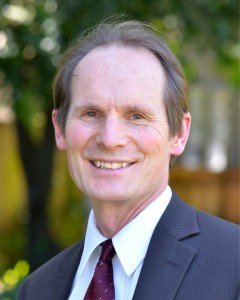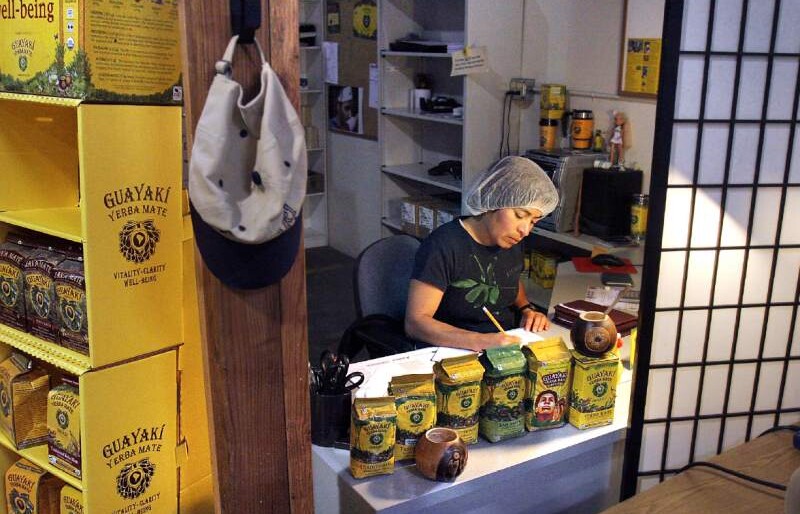(photo: Lucia A. Dias, production supervisor at Guayaki Organic Yerba Mate in Sebastopol)
by Barry Vesser, North Bay Business Journal, November 29, 2016.
A group of Bay Area CEOs who work in the natural food industry have formed a nonprofit Climate Collaborative to help fellow companies set and implement goals to reduce carbon emissions that cause global warming.
It’s the latest in a series of steps by the group, One Step Closer to Organic Sustainable Community, or OSC², in its efforts to promote sustainability and create a resilient system that supports healthful conditions for people and the earth.
One of the board members is Chris Mann, the CEO of Guayaki, based in Sebastopol. Guayakí has been a leader in developing sustainability policies and practices for 20 years. The company produces an organic, fair-trade yerba mate, a stimulating tea from South America, and has successfully demonstrated that a company can be profitable while operating sustainably.
OSC² also includes Numi Organic Teas, Nutiva, Alter Eco, Big Tree Farms, REBBL, 18 Rabbits, The FruitGuys, California Olive Ranch, and Treasure8. The 14 CEOs get together once a month to talk about shared challenges in their business as well as how their companies can become more sustainable.
Mann explained how the OSC² sustainability effort has grown through the years.
Initially, he said, they focused on packaging, because this is a large part of the waste stream. They wanted the most biodegradable, compostable product they could find that would meet the companies’ needs for transparency and keeping products fresh. They found a manufacturer, Innovia Films who was about discontinue a line that would be perfect for their needs. Because they were a group of companies, they agreed to continue manufacturing the product.
OSC² members then began working to make their supply chains more sustainable. Among other things, they pioneered a small fund with San Francisco-based RSF Social Finance, which set up a pilot project with Indigenous, a Sebastopol based fair-trade clothing store; Equal Exchange, which sells fair traded coffees, chocolates and teas; and Guayaki. Under this program, RSF loans money to communities in rural Central and South America which supply goods to these companies so these communities can make the investments that will enable them to more effectively provide fair-trade goods and to lift themselves out of poverty.
But OSC² leaders wanted to do more, Mann said. They partnered with the national Sustainable Food Trade Association, based in Virginia, and created the nonprofit, Climate Collaborative (CC).
Surveys conducted with natural foods companies had found that most companies felt that climate action was urgent, but weren’t sure how to act. The CC set a goal of getting 100 companies to set a significant climate goal and to link the companies together with each other and with third party service providers that could help them set and implement their goals.
The CC developed a list of ten climate commitment areas and requires companies that want to be part of their coalition to choose and implement at least two solutions from the list. Some of the items are: use only sustainably certified forest products, procure 100 percent renewable energy, reduce food waste, be active on climate friendly policy, and source products from regenerative agriculture.
“Regenerative agriculture” is different from organic agriculture: Large-scale organic operations can have carbon footprints very close to their conventional counterparts. Regenerative agriculture reduces carbon emissions by building healthy soil, which retains more carbon; diversifying the food system with more intercropping; and planting food “forests” that require no or minimal tilling. A food forest mimics a woodland ecosystem, with fruit and nut trees making up the upper level, while berry shrubs, edible perennials and annuals make up the lower levels.
The CC launched the campaign for their climate initiative earlier this year at the Natural Products Expo East, the industry’s big annual conference, and will be making another push to sign on companies at the Expo West event in March in Anaheim.
The CC is also partnering with Project Drawdown, based in Sausalito, which is cataloguing the 100 most impactful climate solutions as vetted by a coalition of scientists and advisors. The CC looks forward to benefiting from Project Drawdown’s research when it is completed next year, Mann said.
Working on its own, Guayakí requested and just received a third-party assessment of their climate footprint. The 23-page document by SCS Global Services analyzes the climate impact of their operation and entire supply chain going back to the company’s beginning in 1996. Because the company’s stewardship of South American forests has offset their overall emissions, they are net neutral.
This should not surprise people who know Guayaki. The company has pioneered a business model known as Market Driven Restoration, where the revenue generated from selling yerba mate in North America funds the restoration of rainforests back in South America. Guayakí is a member of the FairTrade Federation, and pays more than double the world market price for yerba mate to provide a living wage to its growers. This price also ensures that the reforestation efforts of Guayakí are viable, and will be protected by families inhabiting the forests, who depend on them for a sustainable income.
Guayakí is a ground-breaking leader in an industry that is poised to demonstrate how business can help address the climate crisis.
Powering the Bottom Line: Barry Vesser directs the Business for Clean Energy Program for The Climate Center. Powering the Bottom Line (nbbj.news/powering) is a periodic column from center staff and volunteers.
OSC2 on the web: www.osc2.org


